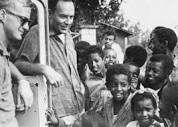Cold Hand of History, The Peace Corps 4
The following week The New Yorker would quote Wofford’s line to the Trainees that they as PCVs in Ethiopia were the new frontier, and on July 9, 1962, the Washington Evening Star, in an article entitled, “Peace Corpsmen Trek West” APCD Bascom Story, as detailed by Gary May, explained the educational situation in Ethiopia to the Trainees where only 5 % of the children attended school, and “it was a tremendous responsibility when you consider that one half of all secondary school education will be carried on by Americans within four or five years.” The Peace Corps Staff expected that with the Volunteers the number of students enrolled in Ethiopia’s secondary schools would double.
Getting ready to teach in Ethiopia, and double the number of students, the Trainees got up the next morning at 5:45 at Georgetown University and did forty minutes of physical training: push-ups, jogging, bending, turning, leaping…etc.
Next was shower, breakfast, and classes in Ethiopian and American history, ‘world affair,’ teaching methods, and Amharic.
“Chaos,” was the word Neil Boyer used to describe training in an article “Ethiopia I-Ten Years Later.”
Father George H. Dunne, S.J. was head of the head of the Georgetown training program. (The main staffer was a man named Gear, and his son also worked on the program. They were immediately dubbed by the Ethie Trainees, “High Gear” and “Low Gear.”)
Father Dunne had gotten the Peace Corps contract just six weeks earlier and was given little time to assemble instructors, psychiatrists, and other personnel. Dunne’s most difficult task was finding a competent Amharic instructor. He hired twenty Ethiopians who were studying the US, but of that group only a few were actually able to teach the language. Finding no “sound textbook,” he was forced to rely on one he thought “pedagogically unsound.” Peace Corps officials described the programs as “weak” and “inadequate”; the Volunteers reported later that “language was the major shortcoming of the Ethiopian project and the one they are most embarrassed about.”
Dunne’s most serious complaint about the Peace Corps was that it was “guilty of pressurized and hasty recruitment” of Volunteers as he wrote in his evaluation of the program. The Ethiopian Ministry of Education was asking for hundreds of Volunteers and Dunne thought the Peace Corps was determined “to supply three hundred people rather than three hundred qualified teachers. Some of those Trainees sent to this project clearly had no particular competence at all,” Gary May quotes Dunne.
The days were filled with classes and hikes and lectures by Chester Bowles and Margaret Mead, and others, and examinations by psychiatrists who, Trainees thought, searched for weaknesses that would lead to “de-selection”. Trainee Carol Miller believed, as she told Gary May, in 1987, “the people doing the screening needed as much help as the volunteers.”
Everyone decided that the “best way” to avoid de-selection was to “keep your mouth shut.”
Linda Bergthold told May in 1987 that the unit on health and medical training was “terrible, absolutely awful.” They showed us microscopic slides of every Ethiopian or African diseases known to the Public Health Service. They had us convinced that schistosomiasis, elephantitis, and leprosy were just around the corner.”
That all said, most of the Trainees enjoyed the eight weeks at Georgetown. As May reports: True, they learned little Amharic and little about Ethiopian history and culture, but they were nevertheless celebrities.
Hometown newspapers and radio stations celebrated their courage and selflessness. They were welcomed at the White House, and at dinners and meetings, Wofford spoke of Ethiopia’s beautifies and Africa challenge. Africans are a young people, making history.
Wofford cast a spell that only the most cynical could reject. Friends and critics alike called him the “Philosopher King” of the Peace Corps. “Wofford had an almost Pollyannaish view,” Linda Bergthold recalled. “He always talked about this common vision which kept swirling around us and moving us forward…the New Frontier…in the Third World. Previously, we had sent technicians…now we are sending people to bring the message of democracy and individual initiative…It was all very romantic and we believed it.”
 Wofford in Ethiopia
Wofford in Ethiopia
No comments yet.
Add your comment